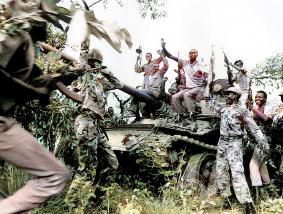Second Sudanese Civil War
| Second Sudanese Civil War | |||||||
|---|---|---|---|---|---|---|---|
| Part of the | |||||||
 Guerrilla forces of the Sudan People's Liberation Army celebrate over a disabled tank. |
|||||||
|
|||||||
| Belligerents | |||||||
|
Non-combat aid: |
Combat aid: |
||||||
| Commanders and leaders | |||||||
|
|
|
||||||
| Casualties and losses | |||||||
| 1–2 million dead (mostly civilians, due to starvation and drought) | |||||||
Stalemate
The Second Sudanese Civil War was a conflict from 1983 to 2005 between the central Sudanese government and the Sudan People's Liberation Army. It was largely a continuation of the First Sudanese Civil War of 1955 to 1972. Although it originated in southern Sudan, the civil war spread to the Nuba mountains and Blue Nile. It lasted for 22 years and is one of the longest civil wars on record. The war resulted in the independence of South Sudan six years after the war ended.
Roughly two million people died as a result of war, famine and disease caused by the conflict. Four million people in southern Sudan were displaced at least once (and normally repeatedly) during the war. The civilian death toll is one of the highest of any war since World War II and was marked by a large number of human rights violations. These include slavery and mass killings.
The Sudanese war is often characterized as a fight between the central government expanding and dominating peoples of the periphery, raising allegations of marginalization. Kingdoms and great powers based along the Nile River have fought against the people of inland Sudan for centuries. Since at least the 17th century, central governments have attempted to regulate and exploit the undeveloped southern and inland Sudan.
...
Wikipedia
